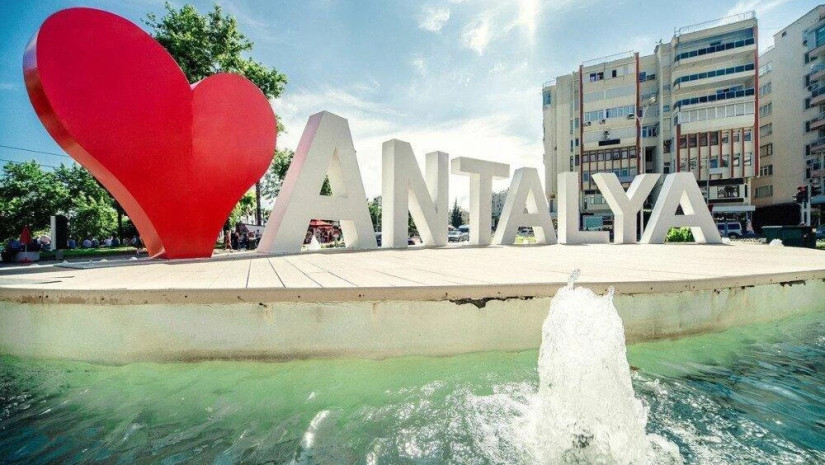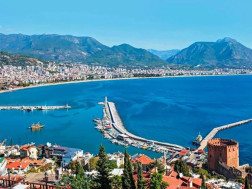Attracting tourists from all over the world, Türkiye’s Mediterranean gem of Antalya hosted more than 11 million foreign visitors in the first nine months of the year, according to the official data.
The majority of the foreign tourists in the city, meanwhile, consisted of Russians and Germans, as the province has been among the top choices of visitors from both countries for years.
The city is currently experiencing its busiest period in tourism after COVID-19 halts.
The number of foreign tourists visiting the city by air between Jan. 1 and Sept. 30 was 11.27 million, according to the data of Antalya Governorship Provincial Culture and Tourism Directorate.
Compared to last year, there was an increase of 57% in the same period.
The city, which was visited by 1.7 million tourists in September last year, received 1.9 million visitors in the same period of this year. There was a 15% year-over-year increase in September figures.
Russians took first place in foreign visitors coming to the southern Turkish city. In nine months, 2.3 million tourists came from Russia.
Russia was closely followed by Germany with 2.1 million tourists and the United Kingdom with 952,246 tourists. Poland, Netherlands, Kazakhstan, Romania, Israel, Czechia and Denmark were in the top 10 countries that sent the most number of holidaymakers to Antalya in the same period.
Tourism revenues are vital to Türkiye’s economy as the government’s economic program focuses on flipping the chronic current account deficits to a surplus, prioritizing exports, production and investments, and aiming to lower the increase in consumer prices.
The government raised its year-end targets in July to 47 million tourists and $37 billion (TL 680.7 billion) in revenues, up from its earlier targets of 45 million arrivals and $35 billion in income.
This year’s arrivals have been mainly backed by Russian visitors, who increasingly opted for Türkiye due to flight restrictions applied by Western countries after Russia invaded Ukraine, as well as tourists from Europe.
Long winter holidays
Meanwhile, Europeans have also started to book hotels in Türkiye to spend the cold months ahead as the Russia-Ukraine war-accelerated energy crisis hit the continent.
November bookings of visitors from Europe, whose energy bills increased more than tenfold, are already up 50%, the tourism sector representatives in Türkiye previously noted.
Particularly, rising energy costs in Germany are pushing many to opt for the financially prudent option of going on a long winter holiday.
Germany's packaged holiday companies have picked up on public sentiment and started offering affordable long stays in southern European and North African countries.
Director of Communications Aage Dunhaupt at TUI, one of the world's leading tourism groups, told Anadolu Agency (AA) that long-term holidays have become a new trend.
“We have indeed seen a trend that people want to go on a long-term vacation, on a long-term vacation over the winter season, so it’s an ongoing trend,” he said. “And the debate in Germany is very strong. The reason could be that people are going there because of the gas prices, the energy prices. And when you're in the sun, of course, you don’t need energy there in that high amount, and in Germany, at home, the prices will not be affecting you,” he explained.
Destinations such as Türkiye, Egypt, Tunisia or Cape Verde offer more than 90% all-inclusive accommodation and will offer a significant benefit, which is already evident from the start of bookings in the winter.
“Türkiye is already the No. 1 destination for Germans and it's already a very strong destination in winter so we see a lot of traffic going to the Antalya region for example,” said Dunhaupt, adding that some travelers were pensioners, others who want to be in the sun, who want to feel better.
“But also, there is this trend workcation, where people can go and work from the beaches. They can go in the afternoon, take a swim, using nice food and that is, of course, an advantage of Türkiye. It has nice food, it is something that the Germans know and that’s why they go there,” he said.
In the Neukolln district of Berlin, Anna and Pablo sit with their heads buried in a laptop looking for cheap long-stay holidays in Türkiye.
They too are worried if they will be able to make the energy bills this winter and have heard from friends about affordable holidays abroad.
Anna says she and her partner can work remotely and would prefer to spend the winter in Türkiye’s Antalya region.
“What’s happening is the cost of living is exploding and we're at a point where we can’t even imagine paying for the heating during the winter and it's getting cold in here, it’s a big apartment,” she said. “(Three thousand) per year is quite much, it's already at 100 bucks a month and if you multiply that by 400% more, it’s so crazy thing.”
“We both work remotely and we're thinking about moving out maybe not completely but at least for the winter and go somewhere where it's more affordable and warmer,” she said.
Electric and gas bills are fast becoming out of reach for the normal consumer. Anna and Pablo are looking to save money while living in Türkiye and sublet their apartment in Berlin.
“Generally speaking, the cost of living is way lower there (Türkiye). We found some options, we have good friends there. The people are friendly, we can stay at a resort and have some nice time with nice weather, and warmth,” said Anna, Daily Sabah reports.
















